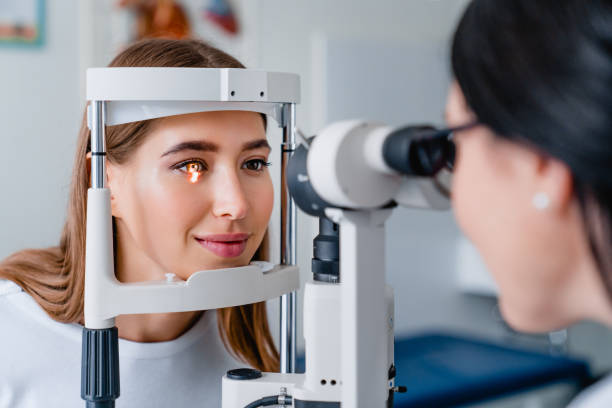Common Eye Problems After 40 – And How to Handle Them
By Dr. Sneha Dokrimare | Consultant Ophthalmologist | Dokrimare Multispeciality Hospital Common Eye Problems After 40. As we grow older, our body naturally undergoes many changes – and one of the most commonly affected areas is our vision. People over the age of 40 often begin to notice changes in their eyesight. Whether it’s trouble focusing on close objects, dryness, blurry vision, or even glare at night, these symptoms are signs that your eyes are aging. In this comprehensive blog, we will discuss the common eye problems after 40, their symptoms, causes, prevention tips, and treatment options. Authored by Dr. Sneha Dokrimare, Consultant Ophthalmologist at Dokrimare Multispeciality Hospital, this guide aims to raise awareness and promote timely eye care for adults. Why Eye Health Deteriorates After 40 From the age of 40, the eyes undergo structural and functional changes. The natural lens loses flexibility (a condition known as presbyopia), tear production declines, and the risk of certain eye diseases increases. Furthermore, systemic health issues such as diabetes, hypertension, and cholesterol problems that are more common in middle-aged adults also negatively impact eye health. This makes regular eye checkups after 40 essential. 1. Presbyopia (Age-Related Farsightedness) Keywords: presbyopia after 40, age-related vision changes, reading glasses for 40+ Overview: Presbyopia is a common condition that typically begins in the early to mid-40s. It affects the eye’s ability to focus on nearby objects. Symptoms: Treatment: 2. Dry Eye Syndrome Keywords: dry eye in adults, symptoms of dry eyes, treatment for dry eyes after 40 Overview: Dry eyes occur due to decreased tear production or poor tear quality, both of which become more common after age 40. Symptoms: Treatment: 3. Cataracts Keywords: early signs of cataracts, cataract surgery, clouded vision over 40 Overview: Cataracts occur when the lens of the eye becomes cloudy, leading to vision impairment. Although common after age 60, early symptoms can begin in the 40s. Symptoms: Treatment: 4. Glaucoma Keywords: glaucoma after 40, eye pressure monitoring, optic nerve damage Overview: Glaucoma is a group of eye diseases that damage the optic nerve, often linked to high intraocular pressure. It can lead to permanent vision loss if undiagnosed. Symptoms: Treatment: Prevention: 5. Age-Related Macular Degeneration (AMD) Keywords: AMD symptoms, central vision loss, macular degeneration treatment Overview: AMD affects the central part of the retina (macula), responsible for detailed vision. It is one of the leading causes of vision loss in older adults. Symptoms: Treatment: 6. Diabetic Retinopathy Keywords: diabetic eye disease, diabetes and vision, retina damage diabetes Overview: People with diabetes are at risk of damage to the retina’s blood vessels, known as diabetic retinopathy. Regular eye exams are crucial for early detection. Symptoms: Treatment: 7. Floaters and Flashes Keywords: eye floaters, flashes of light, retinal detachment symptoms Overview: Floaters are small specks or strings that drift across your field of vision. Flashes may occur when the vitreous gel pulls on the retina. Symptoms: Treatment: 8. Computer Vision Syndrome (CVS) Keywords: computer eye strain, digital eye fatigue, screen time and eye health Overview: Prolonged use of computers, smartphones, and tablets can cause eye strain, especially in people over 40. Symptoms: Treatment: 9. Allergic Conjunctivitis Keywords: eye allergies, itchy eyes, allergic conjunctivitis treatment Overview: Age does not prevent allergies. Many individuals continue to experience seasonal or chronic eye allergies into their 40s and beyond. Symptoms: Treatment: 10. Ptosis (Drooping Eyelid) Keywords: eyelid drooping, ptosis in adults, cosmetic eye surgery Overview: Ptosis refers to the drooping of the upper eyelid, which can interfere with vision and appearance. Symptoms: Treatment: Eye Health Tips After 40 Keywords: eye care tips after 40, prevent vision loss, protect eyesight When to Visit an Eye Specialist Visit an ophthalmologist if you experience: Advanced Eye Care at Dokrimare Multispeciality Hospital At Dokrimare Multispeciality Hospital, we provide: We are committed to offering the best eye care for patients over 40 with compassion and precision. Final Words from Dr. Sneha Dokrimare “Your vision is precious. Don’t wait for problems to start. After 40, regular eye checkups and healthy habits are the key to protecting your eyesight for the years ahead.” Book an Appointment Today!Call: +919527282994 I 07184256063Visit: www.dokrimarehospital.com Dokrimare Multispeciality Hospital – Your Vision, Our Mission.



